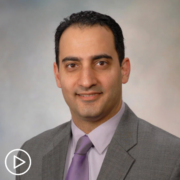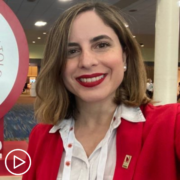Peer Insights: Understanding Cultural Competence vs. Cultural Humility
Peer Insights: Understanding Cultural Competence vs. Cultural Humility from Patient Empowerment Network on Vimeo.
What’s the difference between cultural competence versus cultural humility? PEN’s Vice President of Programs Aïcha Diallo defines cultural competence and cultural humility, and she discusses why they are both vital in healthcare and advice for putting them into practice.
Related Resources:

|

Peer Insights: Practicing Cultural Humility to Empower Your Patients |

Cultural Humility: Fostering Respect & Understanding Your Patient’s Unique Identity Infographic |
Transcript:
Dr. Nicole Rochester:
Today we’re going to talk about the differences between cultural competence and cultural humility, are both essential for fostering inclusive and respectful environments in the patient-physician dynamic. I have the honor and privilege of connecting with the Patient Empowerment Network’s, Vice President of Programs, Aïcha Diallo. Such a pleasure to connect with you today, Aïcha.
Aïcha Diallo:
I’m very happy to be here. Thanks for having me.
Dr. Nicole Rochester:
Wonderful. So, Aïcha, you have been leading community awareness efforts as a public health practitioner for over 11 years. You are a respected voice on cultural humility in healthcare. Can you explain why understanding the concepts of cultural competence and cultural humility is essential for fostering inclusive and respectful environments. And before you go there, if you could clarify for the audience, what is the difference between cultural humility and cultural competence?
Aïcha Diallo:
Absolutely. So they’re both very important concepts, but cultural humility is really taking the time to understand and see the unique elements of your patient’s identity and experience that shapes exactly who they are. And it’s very important because it allows healthcare professionals to be able to listen, show respect, be humble, help give their patients the care and need they want. It also opens up a door for them and their patients to engage better and share decision-making. Now, when it comes to cultural competence, it is knowledge we’ve required through a course or a curriculum is something that as healthcare professionals, we have learned.
So it almost feels like checking off a box. It tends to promote competence and expertise when we know that we can never really be experts at somebody else’s culture or personal history, experience, preferences, and even beliefs. Cultural competence, I have to say, tends to focus on the group trait as a whole. So it would specifically touch on the ethnic and racial backgrounds of a person, while cultural humility looks at the bigger picture, what is their race, ethnicity, age, gender, sexual identity, and more. So that’s the difference between cultural humility and cultural competence. But having both and practicing both as you are interacting with patients, care partners and their families is very important.
Dr. Nicole Rochester:
Wonderful. I appreciate that. I personally have challenges with the term cultural competence, and so I really appreciate you explaining those differences and how really humility, they’re both important, but humility is really that journey that we all should take.
Aïcha Diallo:
Absolutely.
Dr. Nicole Rochester:
So in terms of advice or recommendations for the providers that are watching, how do we operationalize this? What does cultural humility look like on a practical level?
Aïcha Diallo:
So on a practical level, it’s important for healthcare professionals to first identify their own cultural identities and biases. You have to know your own and what you’re coming with in order for you to be equipped to be better present for your patients. It’s important as well, to be honest about their lack of knowledge about a patient’s culture and experience. We cannot know everyone, so learning directly from them is very important. It’s also crucial to not make any assumptions. It’s important to listen, ask appropriate questions.
Again, be humble and respectful of everyone’s culture and experiences. And I would say really give your patients and their care partners or other family members that are in the room or came with them more time to share about themselves. This is a way that healthcare professionals are going to learn directly from their patients and know who they are and what their needs and wants are. I would also add educating oneself and learn about other cultures is another very important component to that.
Dr. Nicole Rochester:
Thank you so much. So if I could summarize what you’ve said, it sounds like it’s important. Of course, we know to practice both, and competency is really that knowledge and education, but as you stated, sometimes it turns into kind of a check the box. I’ve reached the destination and we know that this is really something. There’s never any end point to this journey.
And in contrast, you shared that humility is really about learning, being open to learning, wanting to learn, taking the time, which we know we don’t have a lot of time in these encounters, but taking the time to actually learn about our patients and listening to what they share. And I also appreciate you sharing, it’s also identifying our own identities and biases. So thank you so much for being here and for illuminating this conversation.
Aïcha Diallo:
I would also add to this, that cultural humility is really taking a step back and saying, I don’t know, and I would love to hear more about you. I’m not sure what may be going on here or what you need to add or how I can better find out about your background. Would you like to share more? It’s really that humility piece that’s extremely important.
And that opens up that door, I would say, or leaves room on the table for the patient to also feel comfortable to be sharing more and for them to come to a common ground in order to find the best treatment course for them or the best plan for them and meet them exactly where they are.
Dr. Nicole Rochester:
Meeting them, where they are. Thank you so much, Aïcha. I agree.






